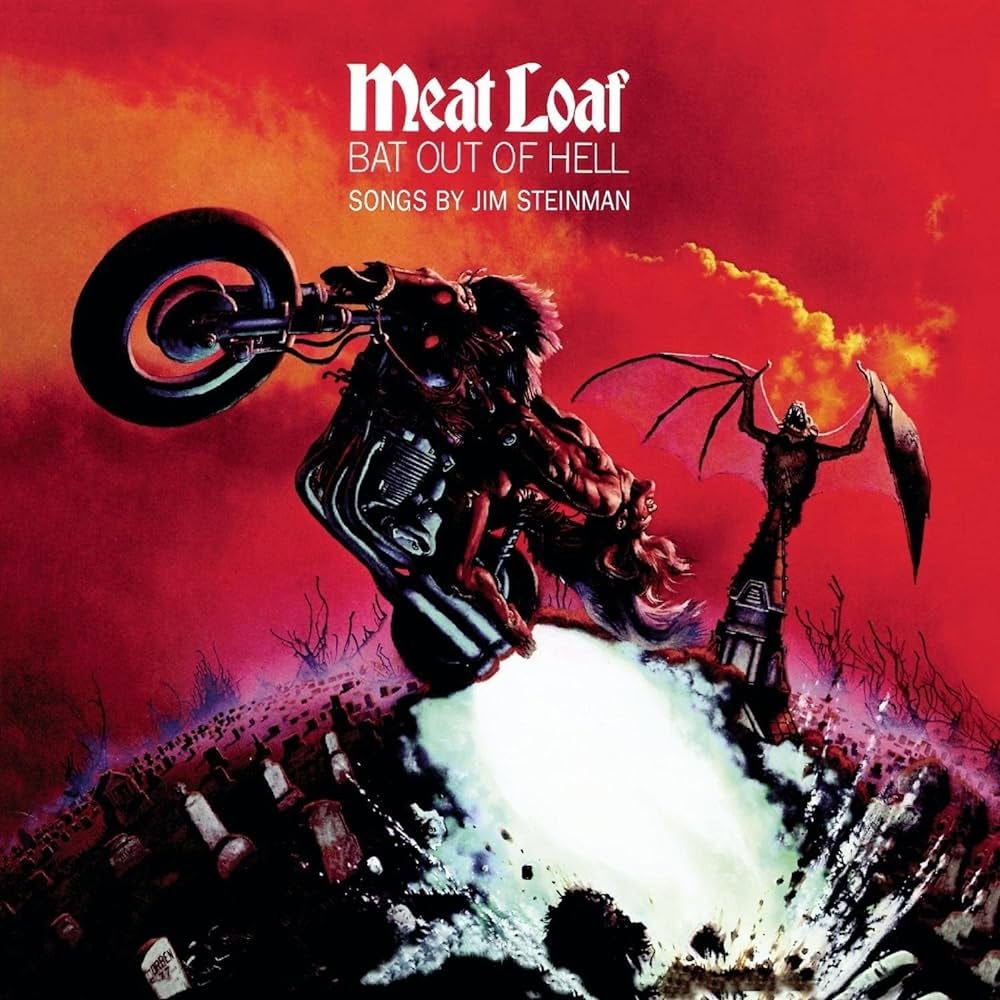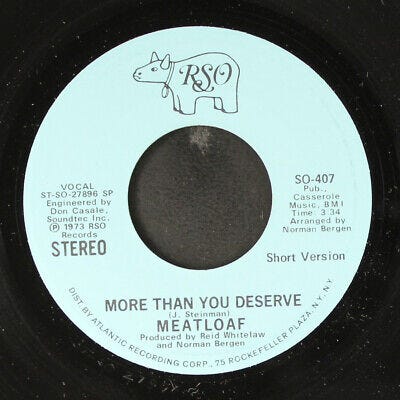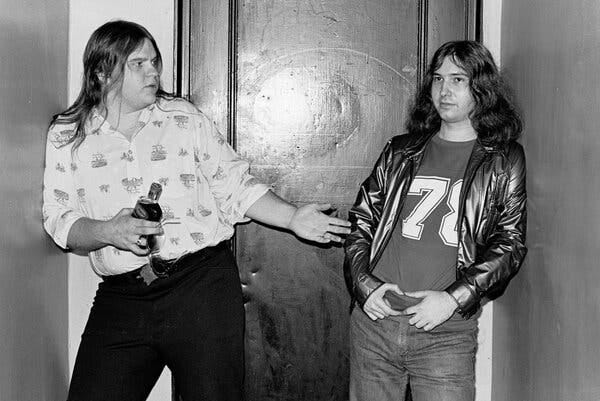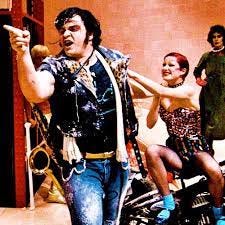Bat Out of Hell by Meat Loaf and Jim Steinman (1977) with producer Todd Rundgren
Todd Rundgren Creator Series
Today is the tenth post in our series about rock legend Todd Rundgren, continuing to cover his career as a producer.
We’ve already reviewed his early years, up to and including The Nazz.
We’ve talked about his pop hits — “We Gotta Get You a Woman” (here), “Hello It’s Me,” (here), and “I Saw the Light” (here).
We’ve covered his first major gig as a producer, The Band’s Stage Fright album (here), as well as a record that appeared to cement Todd’s reputation as a hit-maker, We’re an American Band by Grand Funk (Railroad) (here).
We’ve also talked about Badfinger’s hit singles off their Straight Up album, “Baby Blue” produced by Todd (here), and “Day After Day,” produced initially by George Harrison and finished by Todd (here).
Yesterday we covered the first all-female rock group to release an album on a major label, Fanny, whose fourth album Todd produced (here).
Now we turn to a production, Bat Out of Hell, that might never have seen the light of day because everyone turned it down, except Todd. It’s as if we were there, living it…
Songs of the day
The labels don’t get it
Imagine that you are the head of a record company in New York City, let’s say Arista, and your assistant reminds you that you’ve got an appointment in ten minutes with two guys, Jim Steinman and Marvin Lee Aday, known professionally as Meat Loaf, who want to audition an album.
You know from your A&R guy that this album has been auditioned by other labels and every single one has passed, but you can’t take any chances and not give them an audition. It’s not likely, but what if they turn out to be the next big thing?
Your assistant has worked up a profile because you don’t know these guys from Adam. She gives you a rapid-fire summary on the way to the room where they’re waiting.
“Steinman is a theater guy who’s been working for Joseph Papp at the New York Shakespeare Festival. He wrote the music for a musical that Papp produced and staged a couple of years ago at the Newman Theater called More Than You Deserve. A single of the title song was released, with Meat Loaf from the cast as lead singer, which had modest sales. Steinman also wrote the music for Yvonne Elliman’s single ‘Happy Ending’ on her Food of Love album, an MCA release that failed to chart.
“Meat Loaf, on the other hand, has had bands called Meat Loaf Soul, Popcorn Blizzard, and Floating Circus, this last one opening for the Who, the Grateful Dead, the Fugs, the Stooges, MC5, and the Grease Band. He did Stoney & Meatloaf with Shaun Murphy, known as Stoney, on Motown’s Rare Earth label, with one song making it to #36 on the Best Selling Soul Singles chart and #71 on the Billboard Hot 100 chart. He and Stoney toured with Jake Wade and the Soul Searchers, opening for Richie Havens, the Who, Bob Seger, Alice Cooper, the Stooges, and Rare Earth. Since then he’s been in the musical Hair, Shakespeare in the Park’s As You Like It, and the musical The Rocky Horror Show, which has reportedly been made into a movie.
“And, oh yeah, Steinman and Meat Loaf have been cast members together in The National Lampoon Show, replacing a couple of guys out of the Second City comedy troupe, John Belushi and Dan Aykroyd. Apparently they’ve been working on their own project, and that’s what they’re going to show you.”
She ushers you into the room where Meat Loaf, Steinman, and a woman [Ellen Foley] are waiting, and you deflate when you’re introduced to them. This Meat Loaf just doesn’t look like a star, and the Steinman guy alarms you when he tells you that their project is called Neverland, because he’s obsessed with Peter Pan. Not only that, it’s a futuristic rock version with a song called “Bat Out of Hell.” What have these guys been smoking or snorting? And who’s the audience — metalheads who never grew up?
With Steinman accompanying them on piano, Meat Loaf and the woman sing and act out one song after another. He’s got a powerful voice, that’s for sure, but as the head of a new label, you’ve got to be practical. This is a musical, not a rock record. The songs are just too theatrical. Not to mention, the guy’s sweaty as all get out and Steinman is bleeding on your keyboard.
You’re a bit impatient, having spent about half an hour listening to songs that, hee hee, have a bat’s chance in hell of making it on the rock charts. “I do have a dinner in about 10 minutes so I’m gonna have to rush this, but I do have some notes for you. Starting with you, Mr. Steinman, do you ever listen to contemporary radio?”
When he says yes, you proceed. “Well, I don’t hear that in your music… you have to go back and listen to radio, what pop music’s about… It’s just that you don’t understand what a pop song is, what we’re looking for. I can explain it for you if you want, I can even diagram it, would you like that?”
Steinman agrees, so you get out a little yellow pad and start writing what you want them to remember. “It’s a very simple structure. You start with the verse, A. Second verse is optional, but let’s put it in.” You write A again. “Then there’s a bridge.” You write B. “The bridge is simply the way we go from the verse to the chorus. In the industry we call it the hook.” You add C. “Then you can have an instrument, that’s optional too, but let’s put it in — D instrumental. But then from the instrumental you come back to the hook and you fade in the hook so the audience remembers the hook C, C, C and that’s it. Now that’s what we’re looking for. Basically A, B, C, C, C, C. That’s the key to a hit record. Now with your songs I got lost around W.”
“That’s not good either,” Steinman says, laughing.
You repeat, “You’ve gotta understand this structure. That’s why it has to be this simple. Do you want this piece of paper?” You hand him the piece of paper and turn to Meat Loaf.
“Now I do have to rush ’cause it’s getting late, but you, Mr. Loaf, let me ask you, do you ever listen to contemporary singers?” He doesn’t answer, so you go on. “Well you don’t seem to. You seem to be more in the tradition of a Broadway singer, like Robert Goulet. You just have to adapt your style, so you’re not belting in this legit kind of Broadway, ’cause no one likes that anymore, no one’s interested in it. So the two of you should go back to the drawing board, ’cause there’s some talent here, but I just think it’s so wrong and so misdirected. If you listen to pop radio, and if you listen to a few pop singers, I think you’ll see what they’re going for.”
You’re pleased that you’ve had the opportunity to help them understand why no one is going to sign them and why they must abandon this misdirected project and not waste any more time on it. There’s a reason for the joke going around, that new record companies are being formed just to reject these guys. At least you’ve given them the benefit of your experience as head of a major record label for eight years. Many would sacrifice their mother and their right arm for that.
Meat and his brilliant friend Jim
Now imagine that you’re Meat Loaf and you’ve just been rejected by a label for the upteenth time. You “almost cracked” when the big kahuna at Arista rejected the project.
Even worse than another rejection was that the guy had the gall to lecture Jim on how to write music. Didn’t he just listen to the seven amazing songs Jim has perfected over the past year? Three of those songs — “Bat Out Of Hell,” “Heaven Can Wait,” and “Formation of the Pack (All Revved Up With No Place To Go)” — are clearly exceptional. You should know. You were in two hit musicals with incredible music, Hair and Rocky Horror. Not to mention the soon-to-be-released movie The Rocky Horror Picture Show. Not to mention touring with The Who — twice!
The fact is, Jim is a rock ’n’ roll encyclopedia on legs. He knows every rock record that’s ever been made. That’s why you high-fived him when he screamed “Fuck you, Jive Turkey!" from the street in front of the Arista building. Enough of these musical dinosaurs heading up labels and dismissing genius.
Jim wants to make an album that sounds like a movie. He wants people to feel like they’re entering a cinematic or theatrical environment. What’s so wrong or unusual about that? Have you ever heard of a soundtrack album? How about a rock opera like the Who’s Tommy or Bowie’s Ziggy Stardust? Bowie proved it — futuristic rock sells!
You need someone who ‘gets’ it. What you and Jim are trying to do. Being larger than life and operatic in a rock album that deals with the sexual urges and romantic longings of adolescence.
Who might get that? Someone who’s also a genius, like Jim. Is there even anyone left?
The genius producer
Now imagine that you’re an increasingly busy producer named Todd Rundgren. Your friend Moogy Klingman approaches you about partnering on something and yeah, you’re up for it if he can find something you’re interested in. A few weeks later he comes back with the name Meat Loaf, a name you know from seeing him in The Rocky Horror Show on Broadway.
The guy doesn’t have a demo tape, wants a live audition, which is unusual. On the day, not only does the Big Man show up, but also Rory Dodd and Ellen Foley singing background vocals and Jim Steinman accompanying on piano.
They perform most of what will become Bat Out of Hell, “with all the trademarks that would characterize the act — the surprisingly limber giant stalking around mopping his brow, the glowering phantom at the keys, the spectacle of a tiny girl clinging to the hip of a behemoth.”
Here’s what you see that day — except for Karla DeVito lip-synching to Ellen Foley’s part in these later-produced videos — but Meat Loaf and the others are pretty much the same:
You’re rolling on the floor laughing as you watch them audition. It’s so out there. You tell them, “I’ve got to do this album,” and they tell you that every other producer has turned them down.
You can understand why because it doesn’t make commercial sense. But it’s also clear that nobody is seeing what you see — “a genius spoof of Bruce Springsteen that the world so desperately need[s]. The hyperbolic lyrics about motorcycles and switchblades, the simple triads of the music, the melodrama, the mysterious Svengali at the piano, all fronted not by a hunky denim clad stud but a 250-pound wild man whose head might explode any second.”
You are sold. Your motive is not commercial success, but rather to “make a statement about the whimsy of pop music.” You would have turned it down otherwise. The “almost obscene success” that will come later does not in the least occur to you.
You assemble a band — half Utopia and half E Street Band — and begin rehearsing to record “as live as possible,” only to have Meat Loaf come to you a day before recording to say he wants off the project because his label doesn’t understand him. You are able to rescue the project from the jaws of defeat by getting Bearsville to fund it with right of first refusal. You also end up funding some pricey elements yourself — a symphony orchestra and payment to former sportscaster Phil Rizzuto to add some key narration.
You play the lead solo and then go back and do the harmony guitars in the beginning, all in 45 minutes. Also do the motorcycle sound with your guitar in one take. You mix the record in one night — from six in the evening to four in the morning — which Meat Loaf finds “mind-blowing.” Now to get a label to distribute it.
You almost lose your investment when Bearsville and most labels refuse the record. Stevie Van Zandt of E Street saves the day, getting Steve Popovich, the head of a subsidiary of Epic Records, Cleveland International, to accept the record.
The record stuns everyone by becoming a sleeper hit, but eventually your gamble is outrageously vindicated when it becomes the most profitable album in history, selling an estimated 44 million units worldwide and going 14x platinum in the U.S. alone. In fact, it’s believed to be the sixth highest-selling album in history.
Your magic touch will never again be doubted, and Jim Steinman will refer to you as “the only genuine genius I've ever worked with.”
Let’s hear one of the most innovative and ‘out there’ tracks from the album, “Paradise by the Dashboard Light” — the one that required you to pony up for a sportscaster:
Note: The above perspectives and quotes are taken from the autobiographies of Clive Davis, Meat Loaf, and Todd Rundgren, as well as several articles, including an interview with Jim Steinman in Classic Rock.
Album and song credits
Songwriter - Jim Steinman
Producer - Todd Rundgren
Arrangements
Kenneth Ascher – string arrangements
Steve Margoshes – orchestra arrangement
Band
Meat Loaf – lead vocals, backing vocals, percussion
Todd Rundgren – guitar, percussion, keyboards, backing vocals
Kasim Sulton (misspelled as "Sultan" in vinyl liner notes) – bass guitar, backing vocals
Roy Bittan – piano, keyboards
Steve Margoshes – piano
Cheryl Hardwick – piano
Jim Steinman – keyboards, percussion, spoken word, "lascivious effects"
Roger Powell – synthesizer
Edgar Winter – saxophone
Max Weinberg – drums
John "Willie" Wilcox – drums
Phil "Scooter" Rizzuto – play-by-play
Ellen Foley – lead vocals, backing vocals
Rory Dodd – backing vocals
Gene Orloff – concert master
Marcia McClain – spoken word
Members of New York Philharmonic and Philadelphia Orchestra – orchestra











Great one, Ellen! Creative approach, too.....I've never seen "MeatLoaf" on an RSO label! I never knew he recorded on anything but Cleveland Internat'l/Epic! I knew he did stage work, and I saw the "RHPS" movie. I bet Clive was ticked he let THAT one get away, but everyone who believed in the project deserve mega credit....from Popovich to Todd. If you saw/heard all that walk in, it'd be a dubious sell job, no doubt!
There was nothing else like it at the time. It was so much more theatrical than rock dared allow itself to be....even more bombastic than Alice and Bowie, and anyone else who thought they were anything close to "theatrical"!
One of my very favorite rock 'n' roll stories, and well re-told, Ellen! Clive Davis is in the pantheon of Suits headed by Dick Rowe of Decca - 'the man who passed on the Beatles.' And Todd, vindicated by his own creative genius & sense of humor was able to launch many 'uncommercial' projects of his own thanks to the unexpected revenues from "Bat Out Of Hell."
"So the two of you should go back to the drawing board, ’cause there’s some talent here, but I just think it’s so wrong and so misdirected"
can only be topped by:
"Sorry Mr. Epstein, guitar groups are on their way out. . ."